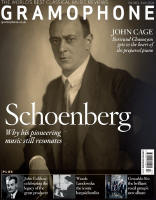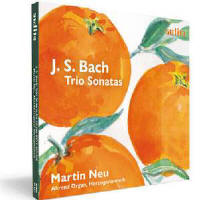Texte paru dans: / Appeared in:
Audite AUDITE97827 |
|
|
|
|
|
Some 12 years have passed since my previous review of Bach’s Six Trio Sonatas for organ. On that occasion (1/12) I praised Robert Quinney’s ability to squeeze a wide variety of colours from the modest 22-stop 1965 Frobenius in The Queen’s College, Oxford. In this new recording for Audite, Martin Neu has at his disposal the slightly larger two-manual newish Ahrend instrument in the church of St Otto in the Bavarian town of Herzogenaurach. One is immediately struck by the immediacy of the recorded sound, which is not so close that the listener is distracted by action noises (which are almost non-existent) or the individual speech of each pipe but which allows Bach’s inexhaustible invention and artful counterpoint to be enjoyed to the full.
Neu generally favours the use of 8ft diapason registers, especially in opening movements, keeping his mutations and upper work in reserve for the more emotionally charged Adagio and Largo movements. Sonata No 1 in E flat begins at a steady, almost dainty allegro, rhythmically incisive and well behaved. Syncopations bounce just as they should. The central Adagio is highly effective and beautifully contoured before we return to a sprightly finale with its almost balletic pedal part.
The Second Sonata in C minor is notable for its first movement’s sparkling runs and what must surely be one of Bach’s most satisfying ‘walking basses’. Did Jacques Loussier’s Trio ever record this? While Neu takes the middle movement too slowly, he more than makes up for this in the third movement, which has an almost plectral quality. Other highlights include the middle Adagio e dolce of Sonata No 3, where every iota of chromatic feeling is savoured and lingered over. Similarly, the central movement of the Sonata No 4 is deliciously limpid and the use of a gentle tremulant in Sonata No 5 provides an attractive timbral contrast.
Needless to say that Neu’s performances are note-perfect with rock-steady tempos, judicious use of ornamentation and a thorough sense of balance. |
|




